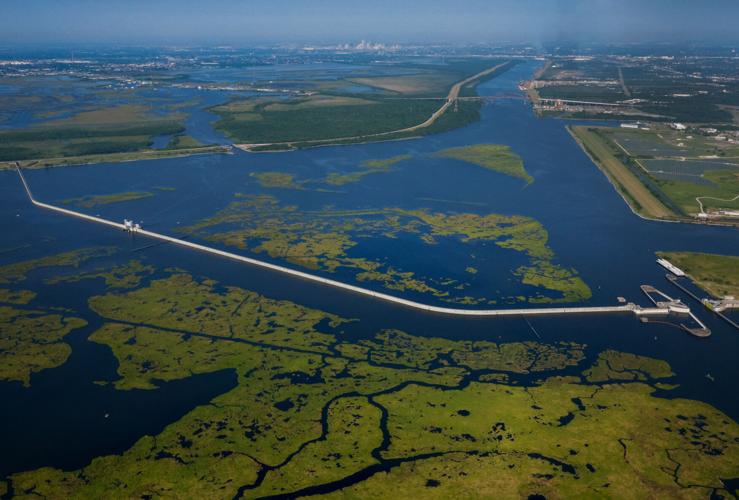Gov. Jeff Landry's insistence on controlling board appointments could endanger reforms aimed at removing politics and egos from oversight of the New Orleans area's levee system, a key figure with the region's flood protection authorities warned Thursday.
Jay Lapeyre Jr., the president of Laitram LLC who also chairs the nominating committees for the two New Orleans area levee boards, said Landry was disregarding changes put in place after Hurricane Katrina exposed deep flaws in the region's flood protections. He stressed the importance of maintaining vigilance over the system, the most expensive project of its kind ever built by the Army Corps of Engineers.
Speaking at Thursday's meeting of the board of the Southeast Louisiana Flood Protection Authority-East, Lapeyre said Landry's decision to not forward the name of University of New Orleans Civil Engineering Professor Norma Jean Mattei, a former president of the American Society of Civil Engineers, to the Senate for its approval as a member of the east bank levee authority "negates the function of the committee."
Lapeyre has served as chairman of the nominating committees for the boards of the Southeast Louisiana Flood Protection Authority-East and -West for 12 years, and has been a member of them for all 17 years since they were formed.
The two nominating committees were set up by a law approved by the Legislature 17 years ago to remove politics and other issues from the selection process. The committees include engineering, science and business experts from universities and civic groups, and they forward one or two names for each board opening to the governor. The governor is not supposed to do anything other than choose between those recommended, if for a position allowed to have two nominees, before forwarding the name to the Senate.
In May, Landry instead simply refused to forward Mattei's name to the Senate. The result is that when the term of present board member Herbert Miller expires at the end of June, the executive director of the levee authority will declare an opening on the board, which is supposed to start the nominating committee selection process again.
Individuals would then have 30 days to submit their names to the committee, which would again choose among them, and forward the name to Landry.
Lapeyre said Landry and his staff have provided no reason for not choosing Mattei, and have not told him whether the governor is interested a new selection method. Landry's staff has not responded to a request for comments on Lapeyre's remarks.
Lapeyre also questioned Landry's championing of a state law change that gives him the authority to appoint the president or chairs of any committees in state government, warning that it also was in conflict with the law setting up the authorities, which required the boards to select their presidents from among their members.
He warned the board that it will be up to them to assure that the goals of the legislators who created the independent authorities remain in place: removal of politics from their oversight of the levee systems.
"What won't change is this," Lapeyre said. "If this community is going to survive, if it's going to flourish, if we're going to have our families and our children and all of our lives invested here, flood protection will remain absolutely 'mission critical' to every part of what we do."
Ironically, soon after Lapeyre ended his comments, the board was notified that Landry had made use of the new law allowing him to select the board's new president, who, along with other board officers, was supposed to be voted on by the board later in the meeting.
In a June 18 email to the authority staff, Landry said he appointed Clay Cosse of St. Bernard Parish to serve as president for a term lasting at the "pleasure" of the governor.
Cosse, who was elected president by the board a year ago, is serving a second four-year board term that ends July 1, 2025.
Cosse served on Landry's Infrastructure Transition Council between Landry's election and his swearing-in. He is a businessman and commercial fisherman, and served three terms as a St. Bernard Parish councilman. He also served 12 years on the Regional Planning Commission.
The board also re-elected Roy Arrigo, of Baton Rouge, as vice president and William Settoon Jr. of New Orleans as treasurer, and elected Deborah Settoon of Metairie as secretary.
In his remarks, Lapeyre said the legislation setting up the levee authorities also separated the non-flood assets owned by the Orleans Levee District and assigned them to a separate board, again in an attempt to assure that politics involved in economic development of Lake Pontchartrain shoreline property would not disrupt levee planning.
In selecting nominees for the authorities, the law requires the committee to assure board members include a specific number of civil engineers and other scientists with expertise in levee and coastal issues, and several business professionals.
He said he thinks that with Katrina so far in the past, the public has lost recognition of the importance of politics-free levee planning and operation.
"What we're seeing is that the public attention has diminished, and we also have a governor who has said that he is not going to sort of live (up) to, or doesn't really have an interest ... in the history of the system or its processes," as shown by the dismissal of the Mattei appointment, Lapeyre said.


